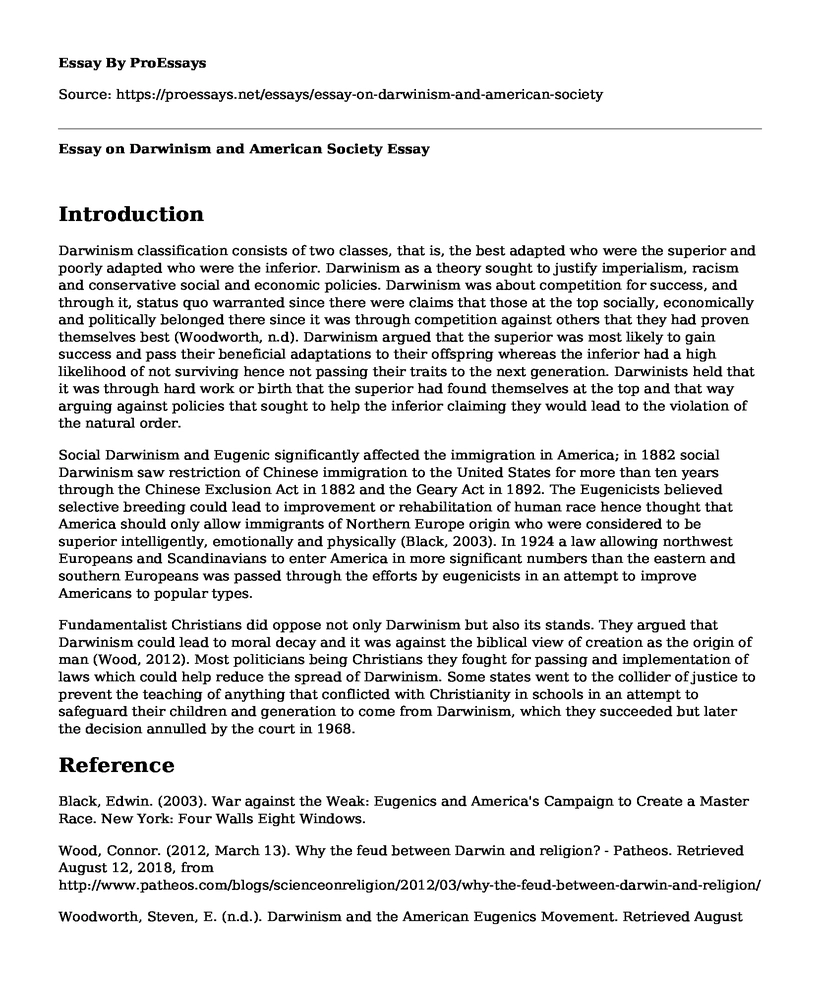Introduction
Darwinism classification consists of two classes, that is, the best adapted who were the superior and poorly adapted who were the inferior. Darwinism as a theory sought to justify imperialism, racism and conservative social and economic policies. Darwinism was about competition for success, and through it, status quo warranted since there were claims that those at the top socially, economically and politically belonged there since it was through competition against others that they had proven themselves best (Woodworth, n.d). Darwinism argued that the superior was most likely to gain success and pass their beneficial adaptations to their offspring whereas the inferior had a high likelihood of not surviving hence not passing their traits to the next generation. Darwinists held that it was through hard work or birth that the superior had found themselves at the top and that way arguing against policies that sought to help the inferior claiming they would lead to the violation of the natural order.
Social Darwinism and Eugenic significantly affected the immigration in America; in 1882 social Darwinism saw restriction of Chinese immigration to the United States for more than ten years through the Chinese Exclusion Act in 1882 and the Geary Act in 1892. The Eugenicists believed selective breeding could lead to improvement or rehabilitation of human race hence thought that America should only allow immigrants of Northern Europe origin who were considered to be superior intelligently, emotionally and physically (Black, 2003). In 1924 a law allowing northwest Europeans and Scandinavians to enter America in more significant numbers than the eastern and southern Europeans was passed through the efforts by eugenicists in an attempt to improve Americans to popular types.
Fundamentalist Christians did oppose not only Darwinism but also its stands. They argued that Darwinism could lead to moral decay and it was against the biblical view of creation as the origin of man (Wood, 2012). Most politicians being Christians they fought for passing and implementation of laws which could help reduce the spread of Darwinism. Some states went to the collider of justice to prevent the teaching of anything that conflicted with Christianity in schools in an attempt to safeguard their children and generation to come from Darwinism, which they succeeded but later the decision annulled by the court in 1968.
Reference
Black, Edwin. (2003). War against the Weak: Eugenics and America's Campaign to Create a Master Race. New York: Four Walls Eight Windows.
Wood, Connor. (2012, March 13). Why the feud between Darwin and religion? - Patheos. Retrieved August 12, 2018, from http://www.patheos.com/blogs/scienceonreligion/2012/03/why-the-feud-between-darwin-and-religion/
Woodworth, Steven, E. (n.d.). Darwinism and the American Eugenics Movement. Retrieved August 12, 2018, from http://www.scienceandapologetics.org/engl/turner.html
Cite this page
Essay on Darwinism and American Society. (2022, Jul 15). Retrieved from https://proessays.net/essays/essay-on-darwinism-and-american-society
If you are the original author of this essay and no longer wish to have it published on the ProEssays website, please click below to request its removal:
- Evolution of Monogamy: Beneficial or Suppressing? - Articles Analysis Essay
- Essay Sample on Canadian Living in America
- Essay Sample on Youth Empowerment
- Essay Example on Equality for Women: Uniting for Sustainable Development
- Essay Sample on Social Media Platforms: Increasing Connectivity & User-Generated Content
- Essay Example on Stereotypes, Aging, and Society: An Exploration
- Essay Sample on Older Adults in California: Challenges & Necessary Support







